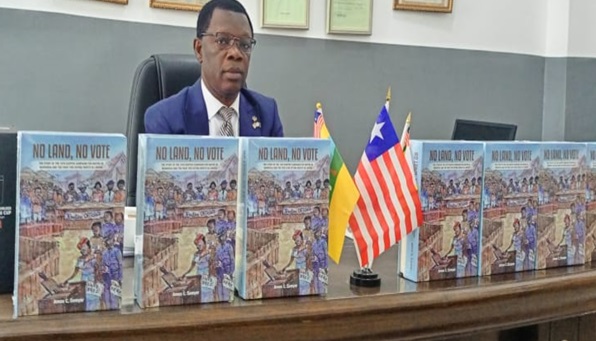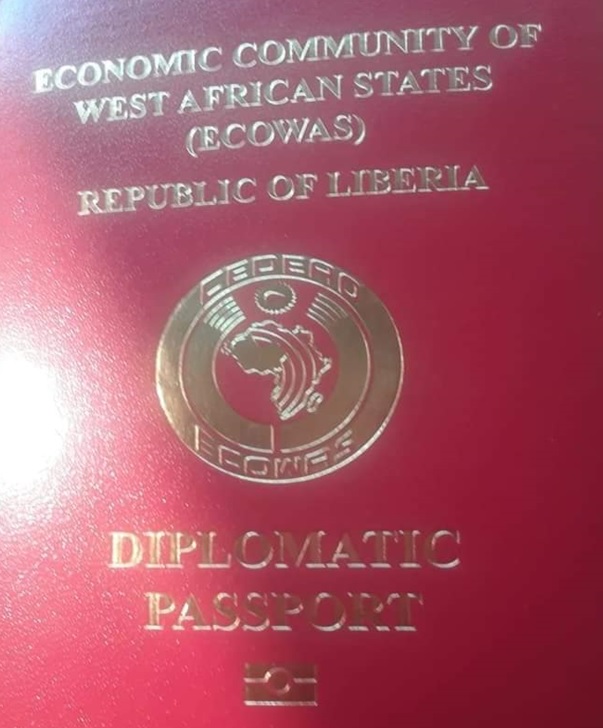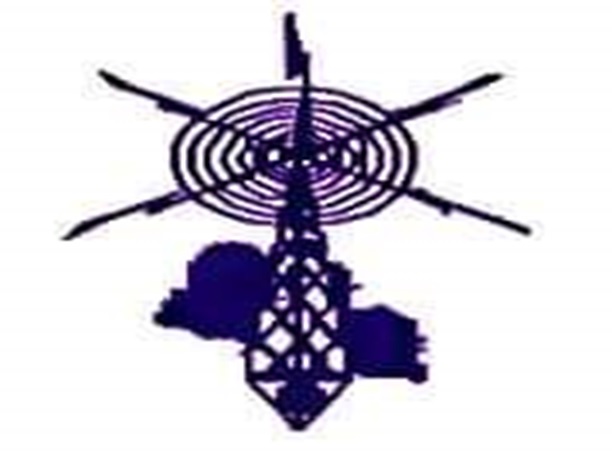MONROVIA – About 125 copies of the latest book: No Land, No Vote, written by Professor Dr. Amos Claudius Sawyer before his death on February 16, 2022, have been delivered to the office of the Dean of the Amos C. Sawyer College of Social Sciences and Humanities, for onward delivery to the President of the University of Liberia, Prof. Dr. Julius Julukon Sarwolo Nelson, Jr. The Dean of Sawyer College was recently appointed as a Member of the Board of Directors of the Amos C. Sawyer Educational Foundation headquartered in the United States of America.
During the formal launch of the Amos C. Sawyer Educational Foundation and book: No Land, No Vote on August 23, 2023, at the EJS Ministerial Complex in Congo Town, Dr. Nelson requested 125 copies of the book for purchase by the administration of the University of Liberia.
The books were delivered on Tuesday, September 5, 2023, at about 8:00 AM to the Dean of the Amos C. Sawyer College of Social Sciences and Humanities, Associate Professor Dr. Josephus M. Gray at his UL Fendall office.
Dr. Sawyer’s latest book grabs the attention of all Liberians and people across the world, particularly all those who stand for human rights and social and political equality, foreword is written by Dr. Togba Na Tipoteh, Professor Emeritus of Economics, University of Liberia and Founding Leader, Movement for Justice in Africa (MOJA), while Preface is written by: Professor Dew Tuan Wleh Mayson, Director of Research and Mobilization, Movement for Justice in Africa (MOJA). The widow of Dr. Amos C. Sawyer who is the current Deputy Minister for Administration, Ministry of Foreign Affairs, Mrs. Thelma E. Duncan Sawyer wrote the
Acknowledgment while the Afterword was written by Dr. Ibrahim Al-bakri Nyei, former Research Assistant to Dr. Amos Sawyer. The latest book contains 14 chapters with several sub-chapters and is on sale for US$50.00 in Monrovia. See below for the full foreword of the book.
This book, No Land, No Vote, written by Professor Dr. Amos Claudius Sawyer before his death on February 16, 2022, should have the attention of all Liberians and people across the world – all those who stand for human rights and social and political equality. This attention should be forthcoming because people who stand for rights and equality believe that everybody is somebody with equal rights. In providing leadership by example, Prof. Sawyer adopted the “walk the talk” posture, where theory is put into practice in the mode of truth-telling.
The title of the book, No Land, Not Vote, is, in effect, saying that every adult has the right to vote and that any situation in which this right is not exercised is a bad situation. Within the “walk the talk” posture, Prof. Sawyer placed his hat in the race for the position of Mayor of Monrovia, the capital city of Liberia. In approaching this race, Prof. Sawyer points out the hypocrisy of the Liberian government that condemned racial discrimination in other countries but perpetuated the same at home. Prof. Sawyer drew attention to the voting situation in Rhodesia, now Zimbabwe, where one could vote without possessing real property (land), but in Liberia, the voter had to have land to vote.
In the struggle for equal rights, Prof. Sawyer disaggregated the Government of Liberia, to show that all persons working in the government are not supportive of the prevailing hypocrisy. Therefore, the expertise of two technocrats at the Ministry of Lands, Mines, and Energy was utilized to get the relevant data on property ownership in Monrovia. The technocrats provided evidence that only 2,640 persons in Monrovia had deeds for land but over 500,000 persons voted in the previous elections to get legislators from Monrovia.
When Rev. William Tolbert, then President of Liberia, received the truth about voting in Monrovia and found that Sawyer was poised to win the race, he said publicly that the Lord appeared to him in a vision and told him to postpone the mayoral election indefinitely. President Tolbert postponed the mayoral election but went ahead and appointed his cousin Edward David to be Mayor of Monrovia.
Prof. Sawyer, although not a Reverend, kept his “walk the talk” posture by not engaging in violence to take revenge for the unlawful act of the government. Instead, he continued his work of sharing knowledge to raise awareness in ways that motivate people to do the right thing; and he always did the right thing by setting examples. Sawyer even worked jointly with his political opponent, Francis “Chu-Chu” Horton, the mayoral candidate of the ruling True Whig Party. Mr. Horton, Deacon of the Baptist Church, was trying to revive the Eliza Native Interior (ENI) Mission School in Sinoe County and Prof. Sawyer, and Episcopalian, served as a Board of ENI Mission Revival Organization, going through bad roads to get a first-hand impression of the work needed to be done to revive the mission school, which takes in students from all over Liberia.
In the “walk the talk” posture of Prof. Sawyer, he pointed out the way to solve problems through raising awareness.
Eventually, President Tolbert felt the mass pressure through the rule of law, and the Government of Liberia dropped the real property requirement for voting. That was a victory for Sawyer, but most importantly for all those who campaigned for the rights of the people through mobilization, education, awareness raising, and non-violent approaches.
With the change in the election law emanating from the awareness-raising campaigns, it is not surprising that Prof. Sawyer became Chairperson of the National Constitution Commission of Liberia in 1981 – which put together the original draft of the current Constitution of Liberia adopted in 1986. We learn from Prof. Sawyer’s awareness-raising in the path-breaking book, No Land, No Vote, that mass action by citizens around common causes and detailed understanding and engagement with national issues can influence change for the good of all members of society.
During the victory attained in reforming the election law, and ensuring that every Liberian, regardless of class and ethnicity, has the right to vote, the system of election management in Liberia remains flawed.
In present-day Liberia, the National Election Commission (NEC) still struggles with organizing a coherent and credible voter roll, and this has led to numerous allegations of illegal voting by foreigners, and individuals voting many times in a single election. The NEC also accepts the nomination from a candidate without verifying their citizenship status and without due diligence on potential criminal records.
Furthermore, while the state institutions now appear to be inclusive, structural conditions of poverty and economic inequality continue to exclude the poor, women, and individuals with disabilities from leadership and political activities.
As for rural residents, they remain essentially marginalized from both political and economic activities in many ways.
These are the challenges of the current era. As seen in this boom, Prof. Sawyer and comrades have laid the foundation for emerging generations to continue to fight for the rights of all and to establish a democratic and inclusive society.
Based on this remarkable contribution – although he is referred to, conventionally, as having passed away – Prof. Sawyer’s knowledge sharing, as seen in this book, will never pass away. It is therefore my hope that this foreword has awakened your interest in reading the considerable problem-solving detail in No Land, No Vote, the path-breaking book of truth-telling by Prof. Amos Claudius Sawyer.







